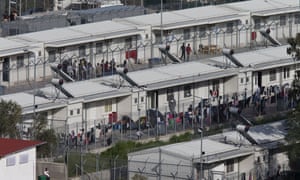Asylum seekers held at detention centre on Lesbos describe Christianity conversion forms seen by the Guardian as insensitive
By Patrick Kingsley

Migrants and refugees inside Moria camp on the Greek island of Lesbos. Photograph: Petros Giannakouris/AP
Christians working in Greece’s most notorious asylum detention centre have tried to convert some of the Muslim detainees, who have been held under the terms of the EU-Turkey migration deal.
On at least two occasions in recent months, aid workers have distributed conversion forms inside copies of Arabic versions of the St John’s gospel to people held at the Moria detention camp on Lesbos.
The forms, seen by the Guardian, invite asylum seekers to sign a statement declaring the following: “I know I’m a sinner … I ask Jesus to forgive my sins and grant me eternal life. My desire is to love and obey his word.”
Muslim asylum seekers who received the booklet said they found the aid workers’ intervention insensitive.
“It’s a big problem because a lot of the people are Muslim and they have a problem with changing their religion,” said Mohamed, a detainee from Damascus. “They were trying this during Ramadan, the holiest Muslim month.”
A second Syrian, Ahmed, said: “We like all religions, but if you are a Christian, and I give you a Qur’an, how would you feel?”

One of the documents distributed at the Moria detention camp. Photograph: Patrick Kingsley for the Guardian
Detainees alleged that the forms were distributed by at least two representatives of Euro Relief, a Greek charity that became the largest aid group active in Moria after other aid organisations pulled out in protest against the EU-Turkey deal. The camp is overseen by the Greek migration ministry, but aid groups perform most of the day-to-day management.
Euro Relief said it disapproved of the distribution of conversion materials, but added it could not rule out the possibility that individual aid workers had distributed the booklets themselves.
The Greek migration ministry did not respond to requests for comment.
The situation is the latest consequence of the closure of a humanitarian corridor between Greece and Germany, and the subsequent enactment of the EU-Turkey deal.
Between January 2015 and March 2016, aabout a million asylum seekers had been allowed to move onwards through the Balkans after landing in Greece from Turkey. But in March, Macedonia shut this humanitarian corridor by closing a crossing point on the Greek-Macedonian border.
A few days later, the EU agreed a deal that could see all those landing in Greece after 18 March deported back to Turkey, in a deal that rights groups say contravenes international law.
The moves have stranded up to 57,000 asylum seekers in Greece – most of them on the mainland, and a few thousand detained on Greek islands such as Lesbos, in overcrowded camps like Moria.
Source: The Guardian

Leave a Reply